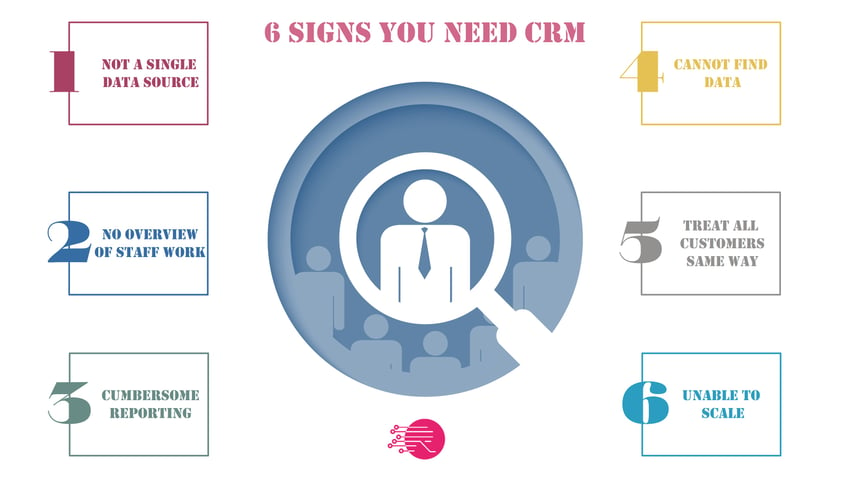After a few decades of existence, there is no doubt that CRM has been a game-changing tool for companies. CRM (Customer Relationship Management) is the biggest software on the market. CRM has helped organizations worldwide focus on relationships with customers, grow faster and work smarter.
Having a CRM system has become a must-have for companies that wish to grow. Despite this evidence, one could wonder if having a CRM system is essential to being customer-centric? Many smaller businesses or local shops thrive without a sophisticated CRM system.
My local baker remembers which type of bread I like and what my name is. They know which cakes my kids prefer. In quite similar ways, companies have managed to know and understand their customers for centuries without the use of a CRM system.
However, there is no denying that the world has changed. It is bigger, customers are more demanding, more impatient and their needs evolve faster. Competition is tougher.
With the wealth of information available on the internet or social media, there is no limit to how much customer data you can get. When have you reached the limits of disconnected spreadsheets, notes or other homemade systems? When is your company ready for CRM?
This article will highlight 6 signs that show that you need to take the Customer Relationship Management (CRM) step.
#1: You do not have one single, central source of data
Many companies still store customer information in various spreadsheets, on sheets of paper or Post-it notes that risk getting lost.
In such cases, sales and marketing teams lack visibility into each other's contacts. If you don’t store your existing customers’ data in one place, you are limiting your view of how your customers are interacting with your company.
This makes it difficult for other people in your organization to get an actual good overview. Capturing data at every stage of a customer life cycle is critical for maximizing sales effectiveness and improving customer retention.
When salespeople track and record customer experiences and interactions in different ways, it is impossible to get a 360-degree customer view.
It is unproductive for your teams to go from desk to desk to find customer information. Manually going through emails, spreadsheets, and handwritten notes to collect information about a customer’s history is just as ineffective.
Using a CRM system such as Salesforce, allows customer-facing employees to store and access customer data in one place. With such tools performing reporting activities becomes easy. You finally have the information you need to run your business and take corrective actions.

#2: You have no idea what your sales teams are doing – nor how well they are performing
If you lack visibility into what your salespeople are doing, it is difficult for you to set sales goals. It becomes difficult to keep them accountable for reaching these goals.
Having a CRM system provides the insight you need into current sales opportunities and deals sales teams are working on. It can be hard to know what the potential value of the deal is or what stage the deal is in. Identifying the best potential customers is impossible.
CRM systems increase customer knowledge. It helps you manage customer expectations. But it also allows you to have a reliable forecast of future sales. And this is essential in order to take corrective actions when needed.
Having insight into your sales team’s activities, you know how your salespeople are spending their time. You can check which activities are more likely to win business.
Salespeople can use this valuable information to identify promising leads, find new customers and fine tune their sales process. The keyword is increasing sales.
Being able to plan effective follow-up activities such as phone calls is not only helping sales management. It also generally gives tighter and richer customer relationships. Therefore it brings more sales and loyal customers.
#3: Cumbersome reporting and analysis
Manually entering data into spreadsheets makes analysis or reporting a time-consuming and painful task. It prevents you from being 100% sure that you can trust the reports you are receiving or if you have the latest version.
CRM products gather all data in one place, allowing you to easily produce reliable reports. You can follow the monthly progress of your sales teams. You can showcase your top sales performers.
Most CRM solutions have out-of-the-box reports that can help you keep a finger on the pulse of your business. They help you set up workflows that provide specific information with a fixed frequency or as a triggered event.
Cloud of on-premise CRM solutions give you an opportunity to act instantly instead of waiting for the monthly report.
#4: You have a hard time finding and sharing customer data
Your salespeople are on the internet or out in the field or on the phone, talking with customers and prospects, finding out valuable new information about them.
This type of information would be highly valuable to anyone having interactions with customers or prospects. Without a fast and easy way to transfer notes and important customer details, they will have to start from scratch at each customer interaction.
If you are not using a CRM software, you are losing data and sales. Often, people store data on hard drives, in emails, in miscellaneous documents, and in random folders. Real time data access becomes impossible.
There is no way to keep your data organized and safe. It does not cater for automated workflows that can really ease the planning and execution of the sales process.
Papers can get misplaced and hard drives can crash. Employees’ laptops could be stolen and you may lose some of your staff. All of these things lead to losing the data you have collected.
A CRM system helps you keep all information about customers at your salespeople’s fingertips. This is regardless of who has had the last customer contact. The information is still in your systems after the employee has left the company.
#5: You treat every customer in the same way
Without a 360 degree view of your customers, your salespeople cannot do anything targeted and end up treating all your customers in the same way. Good, long-term loyal customers are treated equally with those difficult cases with credit problems.
Marketing teams could be sending the same types of offers and messages to customers and prospects in very different stages of the buying process.
They may not be able to send differentiated messages or offers to different industries or geographies.
Your salespeople need to maximize their efforts by targeting prospects based on needs, relevant demographics and potential value.
You want to target prospects with tailored messaging to lead them through the qualification funnel. Using a CRM system such as Salesforce, you identify your customers’ most valuable patterns for you. You can start refining and optimizing your efforts.
#6: You are unable to scale
Excel spreadsheet, sticky notes, Post-it notes and the like might work fine when you have a handful of customers. As your business grows, it becomes literally impossible to track every customer interaction in such tools…
Trying such an approach will make you spend entire days manually entering and analyzing data, monitoring activities and trying to forecast.
This comes with a high risk of mistakes inherent to manual activities. This problem only gets bigger if your business suddenly grows dramatically.
What is the point of fueling a company’s growth if your current processes and systems cannot keep up?
Having a CRM system gives you the ability to view your important data at a glance. You do not have to cobble information together from multiple silos that don’t talk to each other.
A good CRM system such as Salesforce is able to scale with you. As your sales team, customer base, and revenue grows, you can add more users and collect and store more data without stress.
So, what is your CRM verdict?
This is the moment of truth. Do you show any or most of these signs? Then congratulations, you are ready to take your company to a more customer-centric journey.
Next step: the selection of the best fitted CRM system for your needs. While you are investigating the different CRM solutions in the market, have a thought for integration.
Integrating your CRM solution with your ERP solution would help you maximize the ROI in both solutions. So while considering the options, bear in mind that one day, you might want to integrate it with one or more other systems.
If so, you can have a look at data integration options, for example a seamless data integration solution such as RapidiOnline.












